Key takeaways:
- Pro-life advocacy emphasizes the inherent value of life and the importance of personal stories in shaping collective understanding.
- Local support networks are vital, providing resources and creating safe spaces for sharing experiences, which fosters solidarity and empowerment.
- Engaging with community organizations and hosting informational events can galvanize support and deepen connections among advocates.
- Sharing personal experiences is transformative, fostering empathy and a sense of belonging within pro-life advocacy communities.
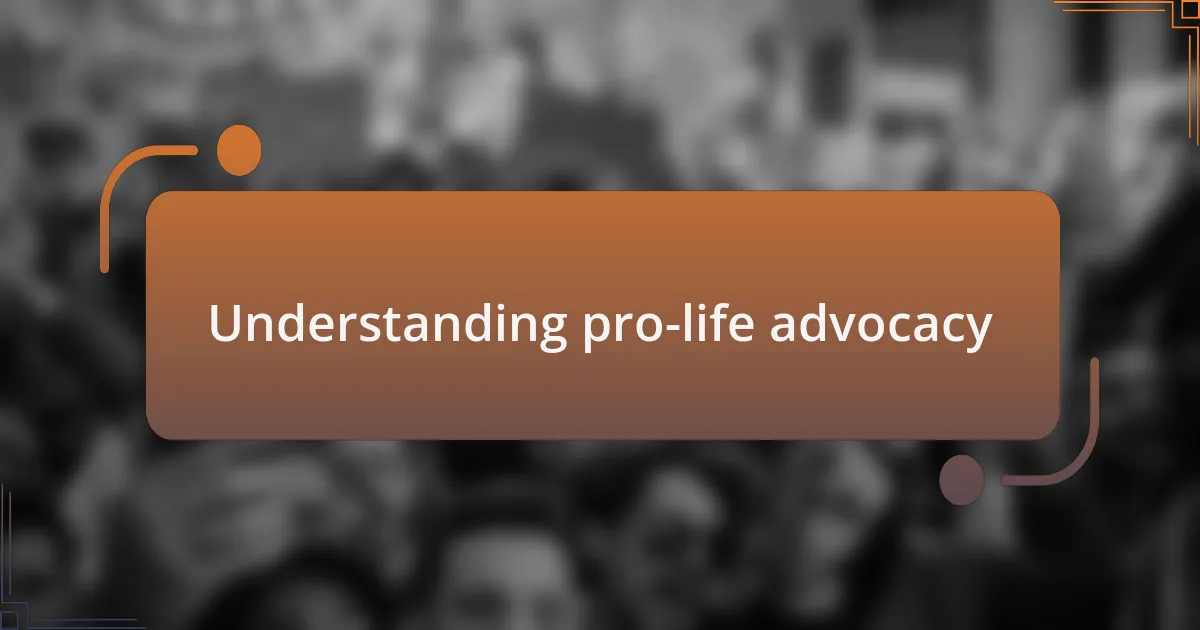
Understanding pro-life advocacy
Pro-life advocacy is rooted in the belief that every life, from conception to natural death, holds inherent value. I remember my first experience attending a pro-life rally; the atmosphere was electric with hope and compassion. It struck me how each participant was driven by a personal story or a profound belief in the sanctity of life.
When I think about what it means to advocate for life, I often reflect on the stories shared by women who have faced unplanned pregnancies. Their experiences highlight the importance of providing not just alternatives to abortion, but also support systems that empower them in their choices. Isn’t it fascinating how individual narratives can shape collective understanding and drive meaningful change?
Moreover, pro-life advocacy encompasses various dimensions, including education, outreach, and community support. In my own journey, I’ve seen that fostering dialogue and understanding is crucial. How can we cultivate an environment where life-affirming options are not just available but actively embraced? It’s about building connections that resonate deeply within society, nurturing a culture where life is celebrated and protected.
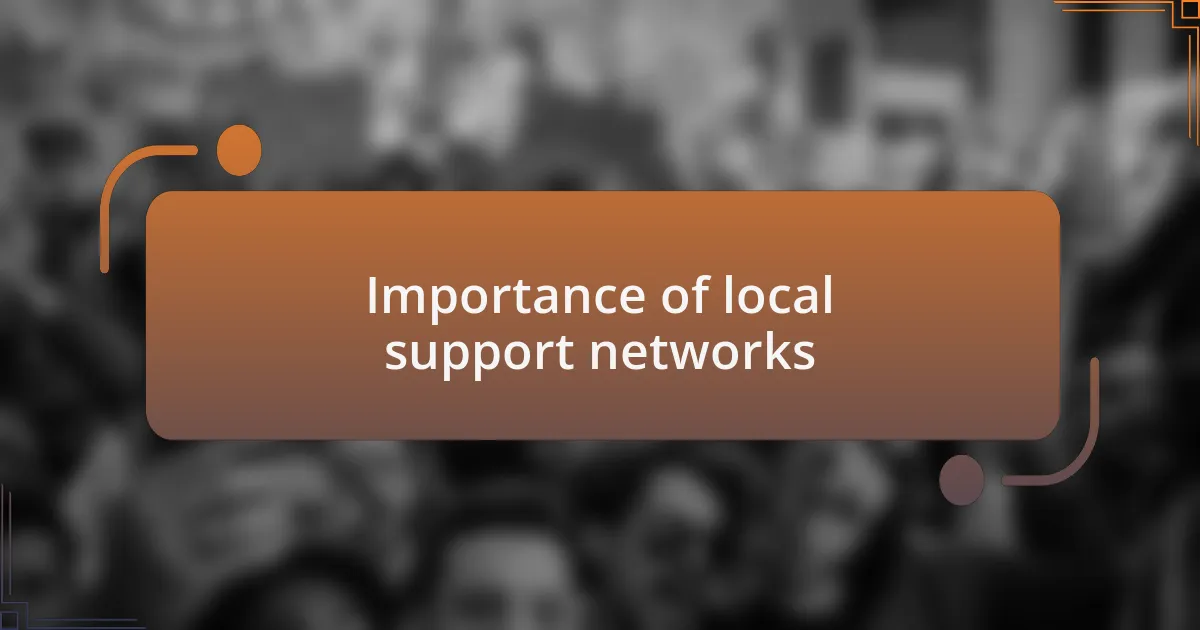
Importance of local support networks
The importance of local support networks in pro-life advocacy cannot be overstated. When I connected with a small group of like-minded individuals in my community, I felt an immediate sense of belonging. It’s incredible how sharing our experiences and ideas can create a powerful force for change, enabling us to uplift those facing difficult choices together.
Having a local network makes resources more accessible. I recall a time when a friend faced an unplanned pregnancy, feelingisolated and fearful. Thanks to our community’s outreach efforts, she found counseling, financial support, and even a caring mentor. This experience underscored for me how local networks can offer not just help, but also hope, ultimately leading to empowered choices.
It’s also about creating a space where people feel safe to share their stories. I’ve witnessed friends transform their pain into advocacy, fueled by the support from those around them. Who better to understand the nuances of these journeys than those who have walked similar paths? This kind of solidarity can be the catalyst for change, strengthening our collective resolve and impact in advocating for life.
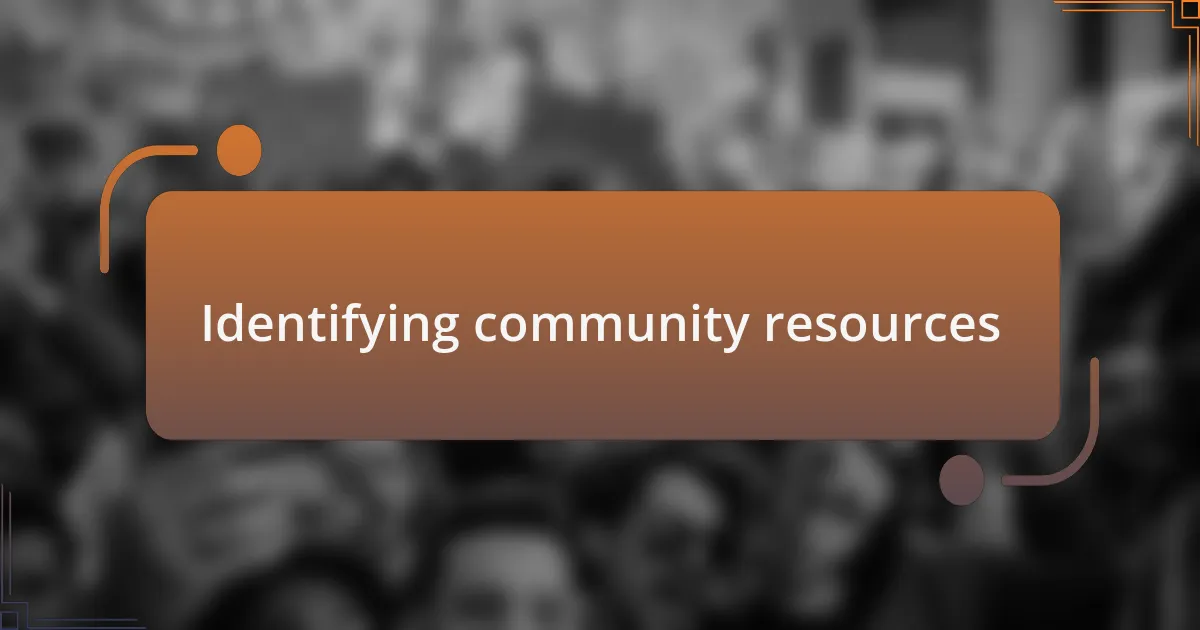
Identifying community resources
When identifying community resources, it’s crucial to start by reaching out to local organizations that align with pro-life values. I remember the first time I called a local pregnancy resource center — the warmth in their voice instantly put me at ease. They had a wealth of information about counseling services and financial aid, which helped me connect others in need to the right support. Have you ever wondered where to turn in a time of crisis? Finding these resources can be a game changer.
Another effective method is to engage with faith-based institutions. My experience attending community church events opened my eyes to how many people were willing to lend a hand. I met compassionate volunteers who were not only aware of local needs but also eager to connect individuals with resources like parenting classes and support groups. Isn’t it inspiring to see how a sense of community can provide practical help in times of uncertainty?
Don’t underestimate the power of social media and local online forums. I once stumbled upon a Facebook group dedicated to supporting expectant mothers, and it was a treasure trove of wisdom and encouragement. Members shared personal stories, offered advice, and even organized events to connect directly with one another. This kind of resource can be incredibly valuable, especially for those who may feel hesitant to seek help in person. How often do we overlook the virtual connections that can bolster our local networks?
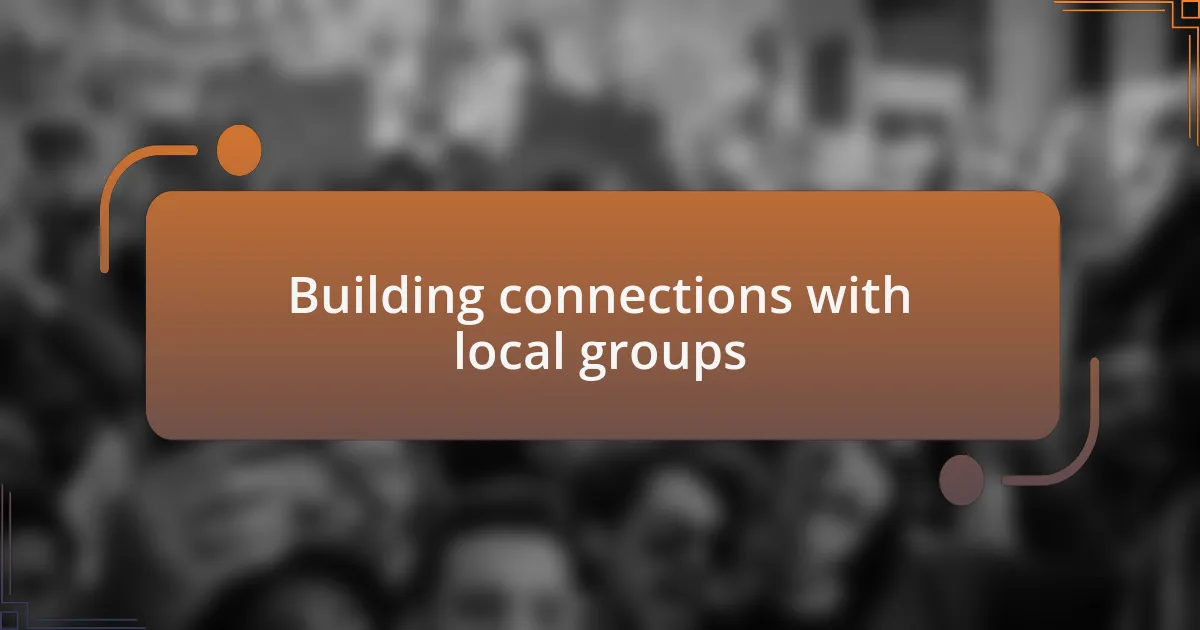
Building connections with local groups
Building connections with local groups can transform your approach to advocacy. For instance, I remember attending a local pro-life rally where I met activists who inspired me with their stories of perseverance and dedication. That day, we exchanged contact information and discussed ways to collaborate, proving how a shared commitment can lead to impactful results. Have you considered how one conversation might ignite your journey in advocacy?
Additionally, reaching out to community leaders can open doors to resources you might not be aware of. I once organized a small meet-up with a few leaders from different organizations, and I was amazed at the brainstorming that took place. Their insights about outreach programs and funding opportunities highlighted the untapped potential in our local area. Isn’t it exciting to think about the collective power we hold when we unite?
Moreover, volunteering at local events is an excellent way to deepen your connections. I joined a community clean-up day hosted by a local group advocating for women’s health, and I met so many individuals committed to the cause. We shared our experiences and built rapport over a shared mission, which made the event not only productive but also heartwarming. How often do we find that the best connections come from simply showing up and engaging with others?
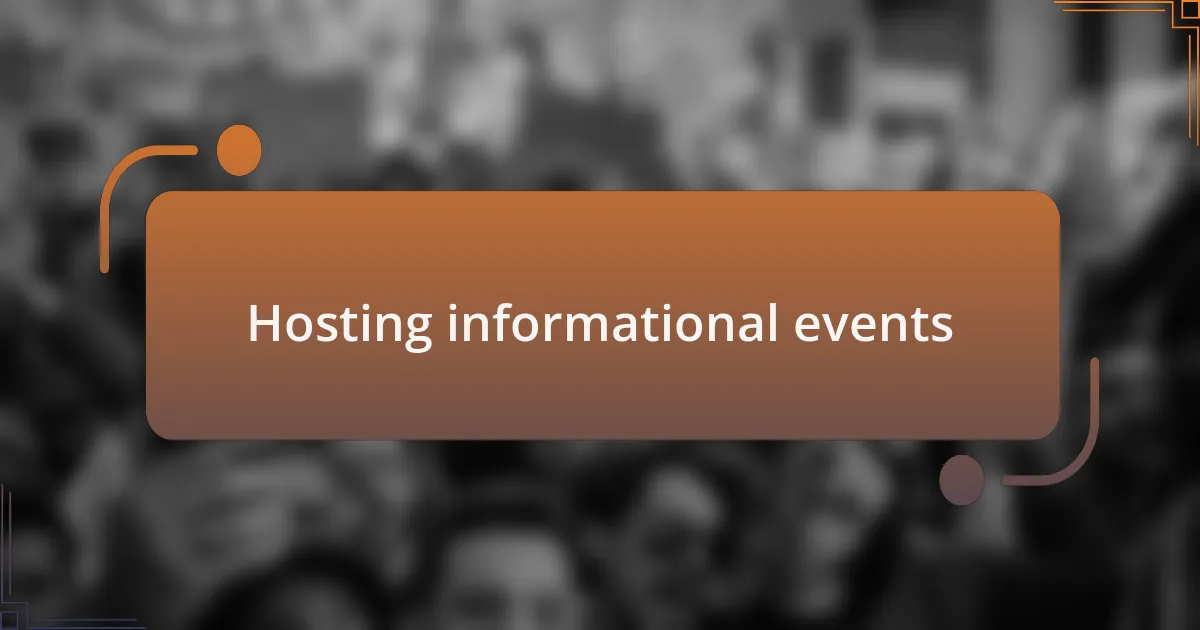
Hosting informational events
Hosting informational events is a powerful way to galvanize support for pro-life advocacy. I vividly remember organizing a workshop that covered the importance of prenatal care. The room was filled with diverse faces, some eager to learn, while others brought personal experiences that enriched our discussion. Seeing people connect over shared knowledge was both rewarding and inspiring.
Creating a welcoming environment is key to a successful event. During one of my early gatherings, I set up a casual Q&A session after the presentation. It quickly turned into an open dialogue where individuals shared their stories. I was struck by how vulnerability can foster community. Have you ever noticed how people are more willing to engage when they feel safe to express their thoughts?
Additionally, collaborating with local experts can elevate your event’s credibility. I once partnered with a healthcare professional who spoke passionately about resources available for expectant mothers. The feedback we received was overwhelmingly positive, highlighting how the right speaker can make a profound impact. Isn’t it intriguing how bringing in the right voices can transform the narrative around our shared mission?
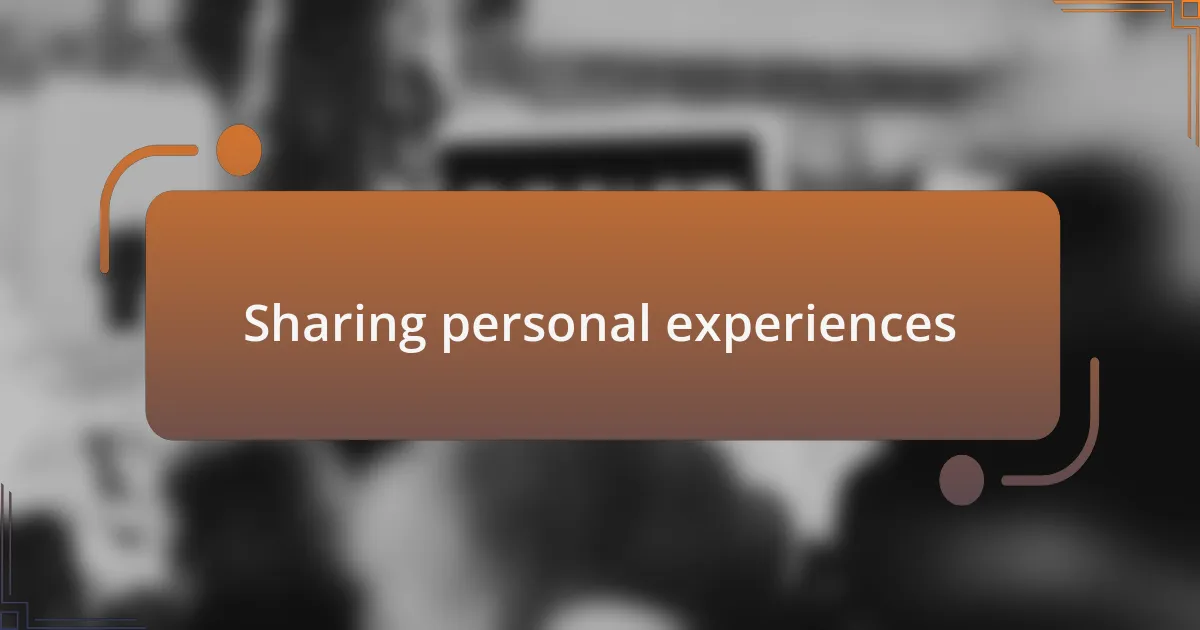
Sharing personal experiences
When I first ventured into pro-life advocacy, I discovered that sharing my own story sparked profound connections with others. I openly recounted my journey through unexpected challenges during pregnancy, which led to discussions that were both poignant and eye-opening. It felt incredible to witness how my experience resonated with others, prompting them to share their own narratives in return. Have you ever noticed how revealing your vulnerabilities can create a bond that feels almost electric?
One evening, I attended a support group, somewhat apprehensive but hopeful. As members took turns sharing their experiences, I listened intently and felt a sense of belonging wash over me. There was something powerful in the room when each voice, unique and honest, contributed to a collective strength. It struck me then—how have our individual stories shaped not just our lives but the community around us?
Reflecting on these moments, I recognize that sharing personal experiences isn’t just cathartic; it’s transformative. Once, during a gathering, a young woman spoke about her journey of choice amid pressure, and the air was thick with empathy. I realized then that every story told had the potential to educate, empower, and unite. Isn’t it astonishing how our personal truths can light the way for someone else in need?
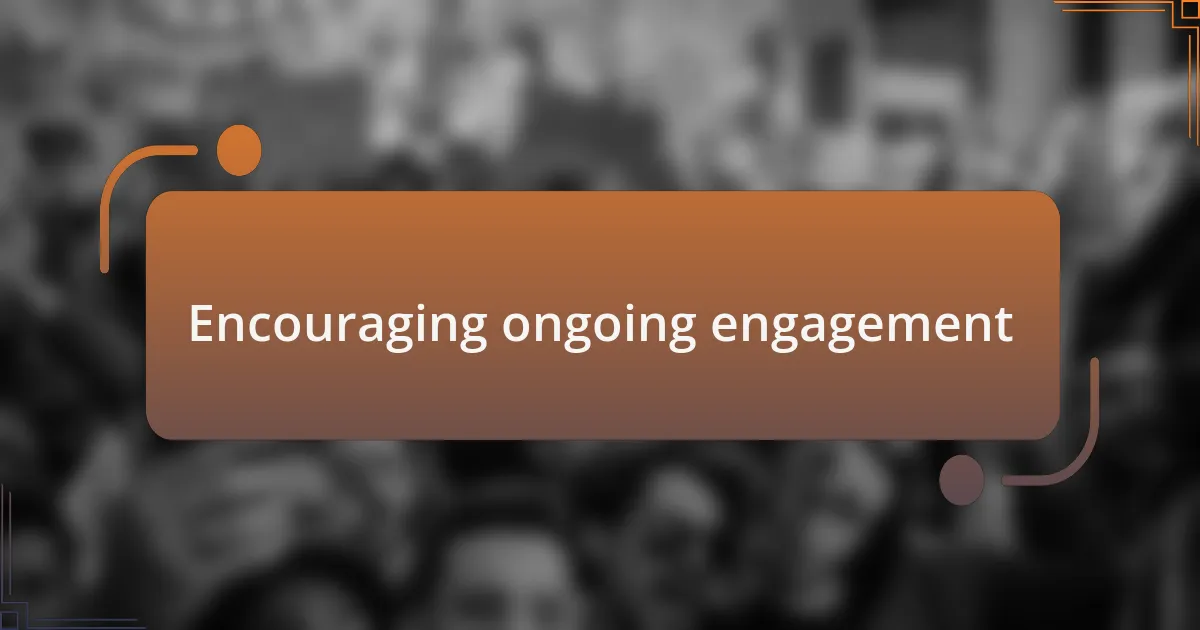
Encouraging ongoing engagement
Encouraging ongoing engagement in a local support network requires intentional follow-up and nurturing relationships. I remember after leading a workshop, I went the extra mile to check in with participants a week later. The simple act of sending a message asking how they were doing resulted in several heartfelt conversations that reignited their passion and encouraged them to share what they were working on. Have you ever realized how a small gesture can reignite someone’s enthusiasm?
It’s essential to create avenues for ongoing dialogue, such as regular meetings or online forums. I’ve found that setting up a monthly coffee chat allows individuals to reconvene, discuss their challenges, and celebrate each other’s successes. These informal gatherings have not only strengthened our connections but also reminded each participant that they are not alone in their journey.
Finally, fostering an environment that invites feedback keeps everyone engaged. I once hosted a feedback session after a series of events and was amazed at the ideas generated. This empowerment not only provided me with valuable insights but also made participants feel their voices mattered. In what ways can we make our supporters feel truly valued and involved?